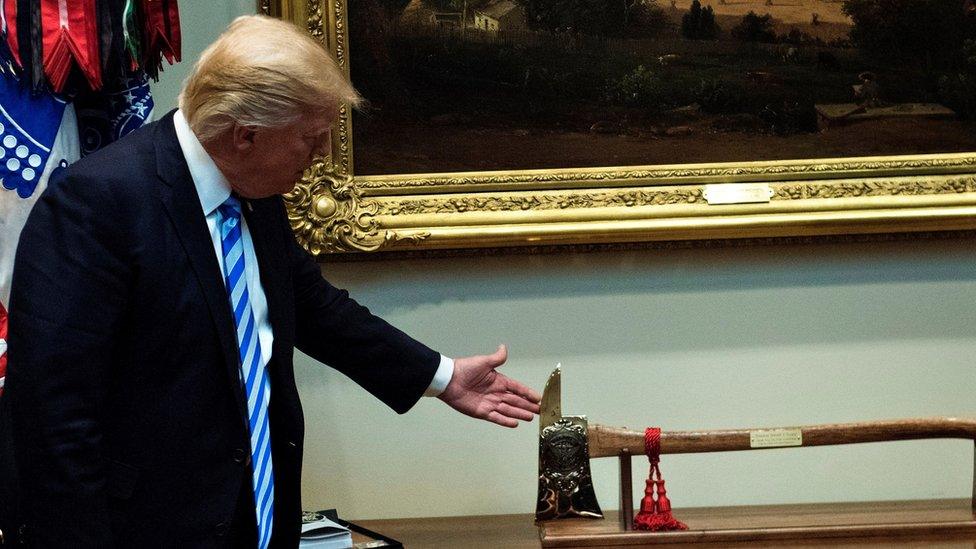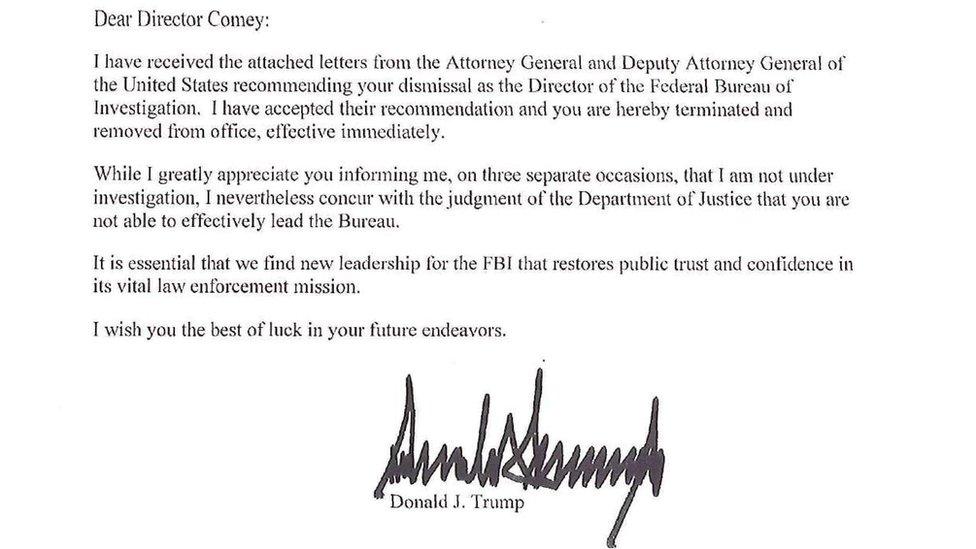Comey fired: The shifting explanations
- Published

Donald Trump is getting used to wielding the axe
"You are hereby terminated."
With those words, Donald Trump became only the second president to fire his FBI director.
But why was he dismissed?
1) The Clinton emails
This was the first official reason. The president opened his missive to Mr Comey by citing a damning letter from Deputy Attorney General Rod Rosenstein that accused the now-former FBI director of "serious mistakes".
Among other things, it said Mr Comey had "usurped" the authority of the former attorney general by announcing last July the closure of the inquiry into Hillary Clinton's use of a private email server.
The letter faulted him for "gratuitously" releasing "derogatory information" about the subject of an investigation - Mrs Clinton.
It even criticised his public reopening of the inquiry 11 days before the election, a step which some say contributed to Mr Trump's shock victory over Mrs Clinton.
At the time Mr Trump had praised Mr Comey's unusual move, saying it "took guts".
Comey explains why he went public reopening Clinton email probe
2) 'He wasn't doing a good job'
This was President Trump's first in-person explanation, given from the Oval Office in an interview with NBC News, external.
He said he had already decided to fire Mr Comey, "regardless of recommendation" as the FBI had been "in turmoil".
This appeared to contradict White House claims that Mr Trump acted on the deputy attorney general's recommendation.
Mr Trump tweeted that Mr Comey had "lost the confidence of almost everyone in Washington".
But Mr Comey's successor, acting FBI Director Andrew McCabe, told the Senate "the vast majority of employees enjoyed a deep and positive connection to Director Comey".

Mr Trump's letter dismissing Mr Comey was released by the White House
3) Russia
Democrats assert that Mr Comey's role leading the FBI investigation into alleged Russian meddling in the election - and possible Kremlin links to the Trump campaign - was the real reason for his abrupt dismissal.
Mr Comey confirmed that such an investigation existed on 20 March, when he spoke before a congressional intelligence committee.
After his dismissal, Politico reported, external the president "had grown enraged by the Russia investigation" and was "frustrated by his inability to control the mushrooming narrative".
"He repeatedly asked aides why the Russia investigation wouldn't disappear and demanded they speak out for him," Politico reported. "He would sometimes scream at television clips about the probe, one adviser said."
President Donald Trump seeks to set the record straight
4) He was a 'showboat'
"He's become more famous than me!" Mr Trump said of Mr Comey at a January meeting, sending an air-kiss his way.
But could this have been a problem, rather than a compliment?
In his NBC interview, the US president described Mr Comey as a "showboat" and "grandstander".
Citing unnamed White House officials, the Wall Street Journal reported, external that Mr Trump chafed at the increased media attention on Mr Comey.
"He viewed Mr Comey as eager to step in front of TV cameras and questioned whether his expanding media profile was warping his view of the Russia investigation," the officials said, according to the report.
WATCH: Trump's love-hate relationship with Comey over a tumultuous year
5) Loyalty
Loyalty is one Mr Trump's most prized qualities - and according to the New York Times, two of Mr Comey's associates say he declined to pledge it.
Over dinner in January, the president asked the FBI head whether he could count on his loyalty, but Mr Comey only promised to be honest, according to the newspaper, external.
Mr Trump is also reported to have been furious that Mr Comey publicly dismissed his sensational claim in March that President Barack Obama had wiretapped him.
After Mr Comey testified to a Senate panel on 3 May that he felt "mildly nauseous" to think he might have swayed the election, Mr Trump began seriously considering firing him, the New York Times reports.